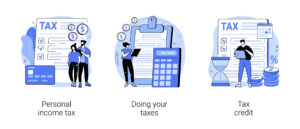IRS Is a Lot More Open to Compromise These Days
It used to be that if you owed a large debt to the IRS you didn’t have a great chance of catching a break. Even though the IRS has always been able to compromise, at least a little, the tax agency has never been really eager to do so. Some people might not even be aware that this was a possibility, but it is. It’s called an offer in compromise and it gives taxpayers with overwhelming debt the chance to pay off that debt for less than the total amount owed.
During the 10 years between 2000 and 2010 the IRS accepted somewhere in the neighborhood of 25-30 percent of these petitions on average, but never reached the 40 percent threshold. However, recently, especially during the last three years the IRS seems to have become a lot more charitable with offers in compromise. That’s good news for taxpayers with large amounts of tax debt.
In the 2012, the IRS accepted 24,000, or 38 percent, of these offers and that number jumped to 31,000, or 42 percent in 2013. In 2014, the number dipped slightly to 27,000 accepted offers, or 40 percent. Typically the IRS does not accept OICs if the agency feels that the taxpayer has the means to pay off the entire debt. However, every situation is different, so if you are considering making an offer in compromise to the IRS to settle your tax debt, then you might want to speak with an experienced tax accountant from GROCO first, in order to weigh your options. You can contact us by clicking here or by calling 1-877-CPA-2006.
Income the IRS Can’t Touch
Income the IRS Can’t Touch There’s one readily available and legal source of untaxed income that we know of: municipal bonds. These securities are issued by state and local governments, school districts, hospitals and other public agencies to support community projects and services. To permit these worthy endeavors to raise money economically, Uncle Sam exempts…
Avoiding Real Estate Tax Revaluations
Avoiding Real Estate Tax Revaluations by Steven Singer, CPA As a result of the passage of Proposition 13 almost thirty years ago, real estate owners currently enjoy paying property taxes based on the property’s purchase price, value of improvements and an annual increase of 2% over the previous years’ assessed value. As a result of…
Annuities in Qualified Retirement Plans
Annuities in Qualified Retirement Plans By Russell Hill Using annuities in qualified retirement plans. Qualified annuities reduce your current taxable salary in addition to accumulating tax deferred earnings, when you contribute money to an annuities program through an employer (as one of the investment options in a salary reduction retirement plan). Those who work for…
Paying Too Much In Taxes?
Paying Too Much In Taxes? By Theodore Lanzaro Now that the end of the year is near, it is time to review a few business tax tips for 2008. Anyone who owns a business or is planning to start a new business in 2008 should be thinking about maximizing the profitability of their business and…


